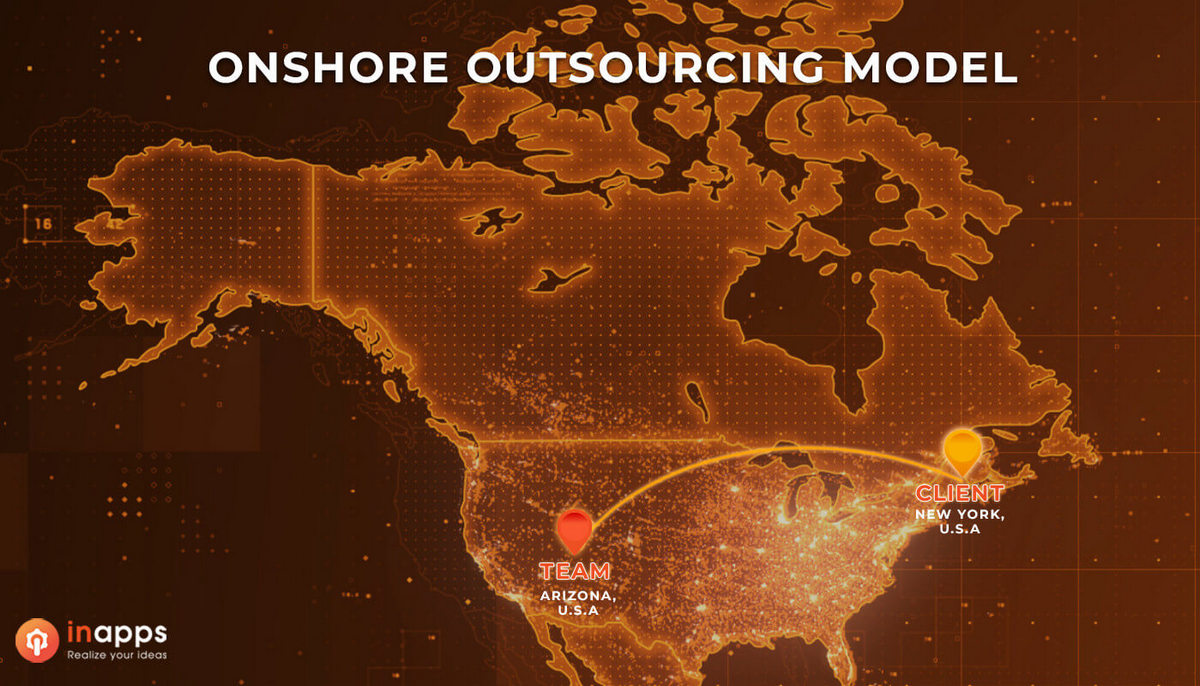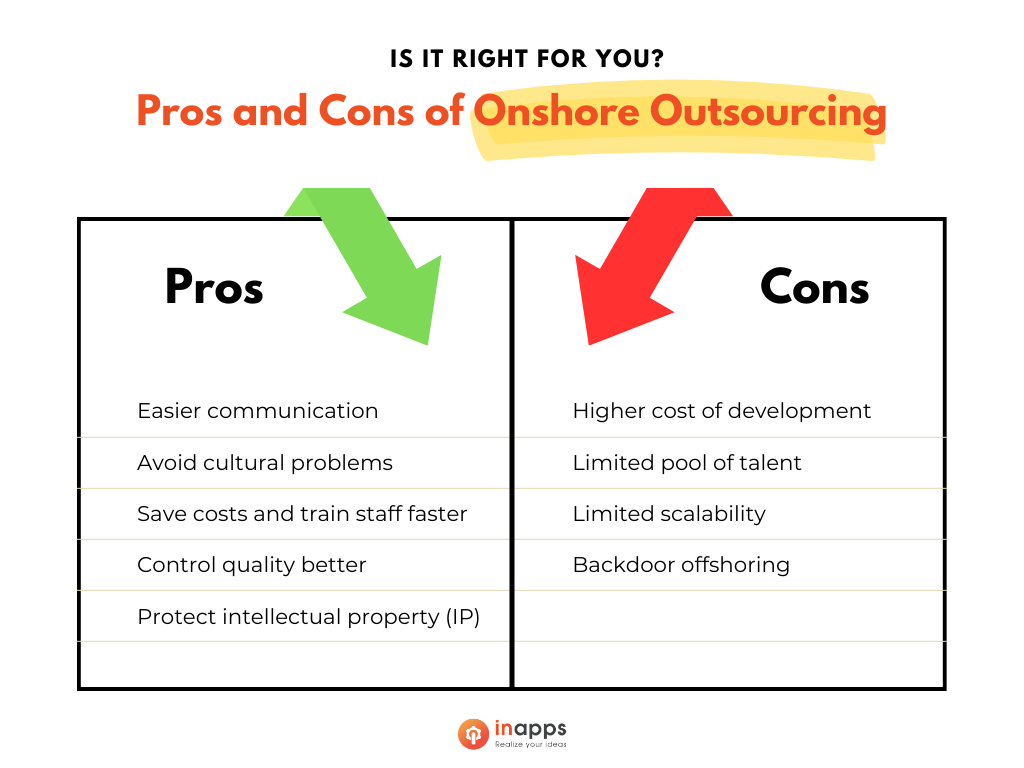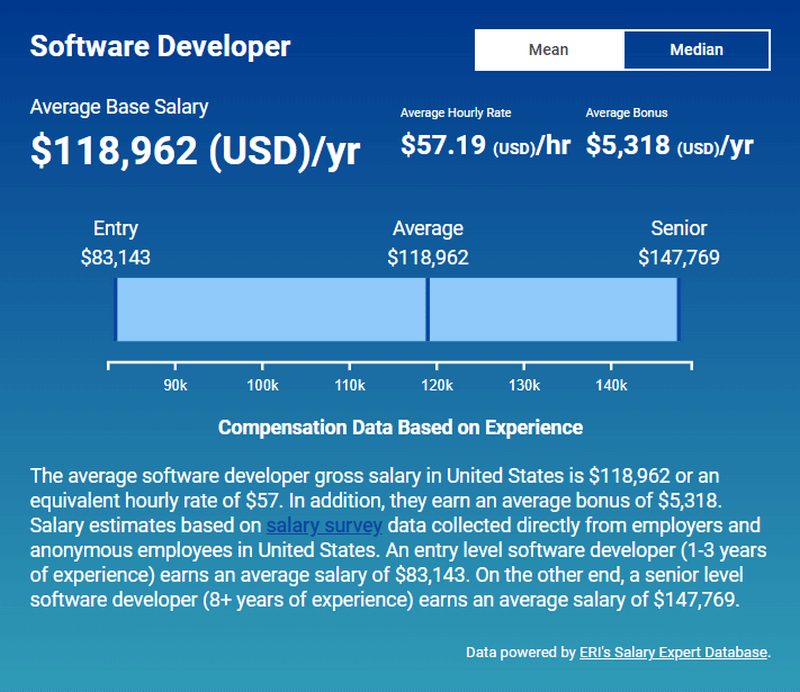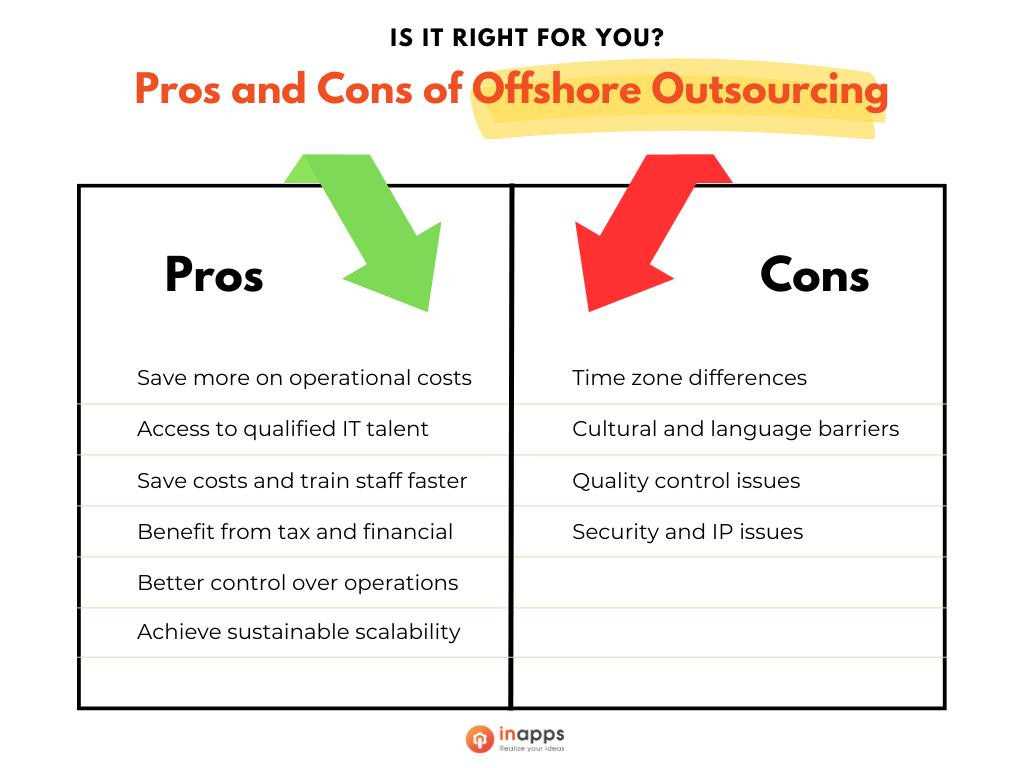One of the main decisions a company must make when outsourcing is whether to go onshore vs offshore outsourcing. Onshore outsourcing means hiring a service provider in the same country or region as the client. Offshore outsourcing involves hiring a service provider in a different country or continent than the client. Both options have pros and cons, depending on various factors such as the scope, budget, timeline, and project complexity.
In this article, we will compare and contrast onshore vs offshore outsourcing and provide guidelines on choosing the best fit for your project. Our team and Inapps experts will also discuss some of the best practices and tips for managing an outsourced project effectively.
By the end of this article, you will better understand the advantages and disadvantages of each outsourcing model and be able to make an informed decision for your next project.
Let’s dive in!
A Quick Comparison Table of Onshore vs Offshore Outsourcing
| Aspect | Onshore Outsourcing | Offshore Outsourcing |
| Location | Service provider in the same country as the client | Service providers in different countries |
| Cost | Usually costlier due to similar expenses. | Generally cheaper due to various, often lower, fees. |
| Communication | Easier due to shared language/culture/time zone. | Challenging due to language/cultural differences/time zone gaps. |
| Quality | Often better due to familiarity with the client’s standards. | Varies based on the provider’s skills, experience, and processes. Some compromises may be needed for cost savings. |
| Risk | Lower risk due to shared legal/security systems. | Higher risk due to differing legal/security systems. |
What is Onshore Outsourcing (Domestic Outsourcing)?
Onshore or domestic outsourcing means getting services from people or businesses in the same country but outside your company. This is the opposite of offshore outsourcing, where services are obtained from individuals or companies in other countries.

The goal of onshore outsourcing is to have another company handle non-essential tasks that still have value for your business but aren’t the main focus, like regular human resources (HR) tasks.
Unlike offshore outsourcing, onshore outsourcing allows for more control and closer communication between the companies. However, this might be more expensive compared to other outsourcing choices, depending on the work needed.
Advantages of onshore outsourcing
There are various benefits to consider regarding onshore vs offshoring. These include the following:
1. Easier communication
Being able to speak the same language is a clear advantage of onshore outsourcing. Communication becomes smoother when a contractor’s employees, like those in sales, marketing, customer service, and support, can speak the local language fluently.

Onshore vs offshore: When comparing the two, onshore receives more votes for making communication easier.
Another perk is dealing with suppliers in the same time zone as the native country, which is more convenient. If you work with a provider in a different country, you always have to think about the time zone difference.
2. Avoid cultural problems
Cultural differences can create big problems when companies outsource work to other countries. But if they choose to work with companies in their own country, they can avoid these issues.
For example, local companies will have the same holidays as their customers, which makes things easier. On the other hand, companies in other countries might take time off for their holidays, making it hard to deal with problems quickly.
There can also be differences in how companies from other countries work. Some cultures might like getting suggestions to make their products better. But in different cultures, giving suggestions might be considered rude and criticizing their business.
These cultural problems can lead to misunderstandings and make it hard to trust each other. This can cause communication problems and make it tough to finish projects successfully.
3. Save costs by not moving abroad and train staff faster
The concept of cutting costs is a major driver behind organizations choosing “offshore” outsourcing. However, this might not always translate to actual savings.
For instance, when you need to address a problem face-to-face, it’s much simpler to meet with a service provider within the same country. Traveling to providers in other countries can be costly in terms of travel expenses and the time it takes.

Additionally, organizations are likely to spend less on project management with onshore projects than overseas ones. Also, project managers won’t need to spend time teaching overseas contractors about company procedures and protocols. This is because most software engineers and creative professionals in the U.S. are probably already familiar with these processes.
4. Control quality better
Picking onshore outsourcing makes it simpler to handle quality control problems. And that’s true!
When a company needs to guide its supplier or service provider on specific work approaches, in-person meetings make it more straightforward to grasp the requirements.
5. Protect intellectual property (IP)
Copyright and intellectual property (IP) laws vary between countries. Other countries might not uphold these laws as effectively as the United States.
This implies that organizations could be taking a risk if they allow offshore suppliers to access their source codes or other confidential information. The United States has more robust laws in place to safeguard intellectual property.
Disadvantages of onshore outsourcing
1. Higher cost of development in the same country
Developing projects within the same country can be pricier than outsourcing offshore. Companies often need to pay extra in certain countries to hire local developers. These developers ask for higher pay due to their country’s higher living expenses. This cost difference makes it challenging to match the lower prices offered elsewhere.
Moreover, following local rules and regulations adds to the expenses. This increases the overall costs and demands more time and resources.
2. Limited talent pool
When you pick local software development, you might have fewer chances to grow than if you go abroad. This can mean more competition, a longer hire time, less expertise, higher costs, and losing talented people. To handle these problems, the company needs to research and find the right partner for development.
3. Limited scalability
Companies face challenges when trying to grow their operations because there aren’t many skilled workers in the local area. This can lead to problems in the scale-up or down as required by the project and may also result in increased recruitment time and costs.
4. Backdoor offshoring
Don’t automatically trust onshore developers without proper research. It’s important to investigate before depending on a company. Some onshore companies send the project offshore for cheaper and faster development. This sneaky practice is known as backdoor offshoring and is unsuitable for the client.

What is Offshore Outsourcing?
Offshore outsourcing is a business strategy where companies hire workers from other countries instead of their own. And, of course, offshore software development is all about cutting costs. For example, many companies send their IT work to countries like Vietnam, India, or China, where labor is cheaper.

Onshore vs offshore outsourcing: Offshore receives more votes for cutting costs effectively.
In recent times, many industries have adopted offshoring. It began with manufacturing companies moving their production to countries like Vietnam and the Philippines to save money. Now, even companies that provide services are looking for affordable workers abroad.
Although outsourcing work to other countries can bring benefits like lower costs, it also has risks. These risks come from dealing with different time zones and relying on the outsourced partner for good work. However, many successful businesses like Microsoft, Apple, IBM, and still outsource their work to other countries.
Advantages of offshore outsourcing
1. Save more on operational costs
On average, a US developer earns $118,962, while a software developer in Vietnam makes $15,840. This stark earnings contrast highlights the notable difference in IT talent compensation between the US and offshore locations.

Offshore teams are common in IT software development. Due to substantial labor cost variations, businesses can save on salaries and direct more funds within the company. Opting for offshore hiring means accessing top-notch IT software developers at a reduced expense.
In addition, hiring offshore brings the benefits of lower costs, including real estate. Additionally, developing countries generally offer reduced rates for Social Security benefits, Medicare, taxes, and insurance compared to the US.
2. Access to qualified IT talent
Finding highly qualified employees is a significant challenge for businesses. Moreover, the ongoing shortage of IT talent in the U.S. demands solutions for this major issue.
Countries like Vietnam and India offer options to hire IT staff. These nations have thriving IT industries due to government support and strong IT programs. With increasing annual graduates from schools, you’re likely to discover suitable candidates. These countries are prominent offshoring destinations, especially in tech development.
3. Benefit from tax advantages and financial incentives
Some countries provide tax breaks and financial rewards to attract foreign investments. This motivates international companies to invest in local manpower, create job openings, and boost business expansion.
By generating employment in foreign settings and sending profits back to the home country, both economies can prosper. The best gains come from pairing offshore company earnings with these advantageous offshore perks.
4. Gain better control over operation
If you’re considering hiring from around the world, you have two choices. You can either bring in talent through outsourcing or hire from offshore locations. You retain full control of your business operations when you opt for offshoring.
On the other hand, outsourcing comes with limitations on business operations. It’s crucial to understand this distinction, especially if you’re aiming to establish a global team.

Teaming up with an offshore company grants you freedom and authority over your team. You can decide to train your employees or provide instructions to your offshore partner. Ultimately, you maintain complete control over the tasks while the offshore partner ensures your requirements are met.
5. Achieve sustainable scalability
Imagine your software team is in the midst of a sprint with just one step to go. This situation impacts your project’s schedule, prompting the need for quick adjustments and a swift replacement for the departing team member. While you search for a replacement, your existing team can distribute the workload among themselves. Meanwhile, your recruitment team must find, train, and onboard a new member.
Here’s the thing: if you take on the candidate search and hiring responsibility, you’ll end up spending a significant amount on maintaining the recruitment team. However, collaborating with an offshoring company can offer a speedy solution to this predicament.
Offshoring companies possess a pool of pre-screened candidates ready to be considered for clients. When employees leave, they already have a suitable replacement with the right skills on standby. This saves you both money and the effort needed to sustain your HR and recruitment team.
Disadvantages of offshore outsourcing
1. Time zone differences
As noted earlier, countries such as Vietnam, India, and China have gained popularity as offshore options for Western nations. However, this situation leads to Western companies needing to collaborate despite time differences exceeding 6 hours with their offshore counterparts.
Consequently, teams in distinct time zones may encounter challenges related to communication and meeting deadlines. For instance, arranging a team meeting that includes all members can be problematic due to the varying time zones.
2. Cultural and language barriers
Even though offshoring connects distant places, there are still differences in culture and language. In well-liked offshoring spots like Vietnam, the workers can speak English and understand world customs, but English is not their first language.

Also, the leaders at the main office might need to learn more about the local ways of their overseas team. This can cause issues with things like deciding holidays or talking every day. Simple things like needing to understand body language or jokes can lead to problems between team members.
3. Quality control issues
When products are developed offshore, there are always challenges related to maintaining good quality. Yet, when a company outsources work to third-party vendors abroad, the concerns about quality can become even more significant. This is mainly because the conditions and rules for production might be very different in the foreign country compared to your own.
Even if you give clear instructions and communicate well, what you get from the offshore company might not be what you were hoping for. And if there are disruptions or delays in the local supply chain, it can further affect the final delivery.
4. Security and intellectual property (IP) issues
Last but not least, whenever vital business information is shared, there’s a chance it could be stolen. And this risk becomes even more significant when the other party is far away in an offshore location.
For instance, patents are typically only protected in specific countries. The rules of those countries will determine how your company’s intellectual property is secured. Getting this protection means dealing with more paperwork and expenses.
Moreover, no matter where your customers are, their data might end up stored on servers in offshore places. The laws about protecting this data in those countries might not be as strong, which could expose you to potential breaches.

Conclusion: Onshore vs Offshore Oursourcing – Which one best suits your business IT projects?
Onshore and offshore outsourcing are two strategies businesses use to save money, tap into specialized skills, and boost effectiveness. Onshore outsourcing means hiring external help from within your country or region, while offshore outsourcing means hiring from a foreign country.
The main distinctions between onshore and offshore outsourcing include costs, talent availability, language/cultural hurdles, quality control, and distance. It’s crucial to consider all these factors when deciding between onshore and offshore outsourcing so you can pick the right fit for your business.
How to Find a Trusted and Qualified IT Offshore Outsourcing Partner
Are you considering outsourcing your software development needs? Please don’t worry about anything else. InApps Technology is a prominent player in the mobile app development sector. As a reputable company, we specialize in services ranging from product engineering and digital transformation to emerging technologies and beyond.
We have been operating in Ho Chi Minh City, Vietnam since 2016. With a dedicated team of over 100 skilled developers, designers, testers, and project managers, we have successfully delivered over 200 projects across diverse industries and international borders.

Our goal is to establish ourselves as a trusted global technology partner. We achieve this by consistently offering innovative, high-quality solutions that cater to the ever-evolving needs of businesses worldwide.
At the helm of InApps Technology is our founder and CEO, Tam Ho. With his leadership, we have enabled numerous startups and brands to succeed through robust technological solutions.
Discover more about us and our journey by visiting InApps Technology’s website. Join hands with us and turn your ideas into reality with exceptional results. Thank you for reading!
Let’s create the next big thing together!
Coming together is a beginning. Keeping together is progress. Working together is success.


















